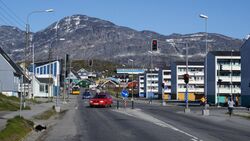Social:Self-governance
This article needs attention from an expert in political science. (December 2015) |
| Part of a series on |
| Governance |
|---|
| Models |
| By level |
| By field |
| Measures |
| Related topics |

Self-governance, self-government, or self-rule is the ability of a group or individual to exercise all necessary functions of regulation without intervention from an external authority.[2][3][4] It may refer to personal conduct or to any form of institution, such as family units, social groups, affinity groups, legal bodies, industry bodies, religions, and political entities of various degree.[4][5][6]
Self-governance is closely related to socio-philosophical concepts of self-control and self-discipline, and to socio-political concepts of sovereignty, independence and autonomy.[7] In the context of nation-states, self-governance is called national sovereignty which is an important concept in international law. In the context of administrative division, a self-governing territory is called an autonomous region.[8]
Self-governance is also associated with political contexts in which a population or demographic becomes independent from colonial rule, absolute government, absolute monarchy or any government which they perceive does not adequately represent them.[9] It is therefore a fundamental tenet of many democracies, republics and nationalist governments.[10] Mohandas Gandhi's term "swaraj" is a branch of this self-rule ideology. Henry David Thoreau was a major proponent of self-rule in lieu of immoral governments.
Background
In ancient Greek philosophy, Plato posits the concept of self-mastery as the ability to be one's own master. He outlines that unless individuals or groups govern their own pleasures and desires they will be enslaved and will not be free.[11][12] This concept is understood by scholars as a fundamental moral freedom but also as a necessary condition of political freedom, and by extension the freedom and autonomy of the political structure.[11]
John Locke shared a similar view that genuine liberty requires cognitive self-discipline and self-government, and that man's capacity for this is the source of all freedom. In this sense, freedom is not a possession but an action.[13] Locke proposes that rationality is the key to liberty and true agency, and that political governance is enabled by the governing of one's own judgement.[14] His political philosophy was a prominent influence on Immanuel Kant, and was later taken up in part by the Founding Fathers of the United States.
The nature of self-governance, that freedom relies upon self-regulation, was further explored by contemporary academics Gilles Deleuze, Michel Foucault, Judith Butler, William E. Connolly, and others.[15]
Means of self-governance
The means of self-governance usually comprises some or all of the following:
- A code of conduct that outlines acceptable behavior within the unit or group.[16] This may include a legal or ethical code (e.g. the Hippocratic Oath of doctors, or established codes of professional ethics).
- A means of ensuring external authority does not become involved unless and until certain criteria are satisfied.
- A means of facilitating the intended functions of the unit or group.
- A means of registering and resolving grievances (e.g. medical malpractice, union procedures, and for achieving closure regarding them).[citation needed]
- A means of disciplinary procedure within the unit or group,[17] ranging from fines and censure up to and including penalty of death.
- A means of suppressing parties, factions, tendencies or other sub-groups that seek to secede from the unit or group.
See also
- Anarchism
- Consent of the governed
- Secession
- Self-determination
- Self-governing colony
- Self-management
- Self-ownership
- Sociocracy
- Swaraj
References
- ↑ Greenland in Figures 2012. stat.gl. ISBN 978-87-986787-6-2. http://www.stat.gl/publ/en/GF/2012/content/Greenland%20in%20Figures%202012.pdf. Retrieved 10 February 2013.
- ↑ Rasmussen 2011, p. x–xi.
- ↑ Sørensen & Triantafillou 2009, pp. 1–3.
- ↑ 4.0 4.1 Esmark & Triantafillou 2009, pp. 29–30.
- ↑ Sørensen & Triantafillou 2009, p. 2.
- ↑ Sørensen & Torfing 2009, p. 43.
- ↑ Rasmussen 2011, p. x.
- ↑ Ghai & Woodman 2013, pp. 3–6.
- ↑ Berlin 1997, pp. 228–229.
- ↑ Rasmussen 2011.
- ↑ 11.0 11.1 Young 2018.
- ↑ Laks 2007.
- ↑ Casson 2011, pp. 159–160.
- ↑ Casson 2011, pp. 160–161, 167.
- ↑ Rasmussen 2011, p. xiii.
- ↑ Esmark & Triantafillou 2009, p. 31.
- ↑ Esmark & Triantafillou 2009, p. 32.
- Bird, Colin (2000). "The Possibility of Self-Government". The American Political Science Review (American Political Science Association) 94 (3). https://www.academia.edu/1312067/The_possibility_of_self-government.
- Sørensen, Eva; Triantafillou, Peter (2009). "The Politics of Self-Governance: An Introduction". The Politics of Self-Governance. ISBN 978-0-7546-7164-0.
- Esmark, Anders; Triantafillou, Peter (2009). "A Macro Level Perspective on Governance of the Self and Others". The Politics of Self-Governance. ISBN 978-0-7546-7164-0.
- Sørensen, Eva; Torfing, Jacob (2009). "The Politics of Self-Governance in Meso Level Theories". The Politics of Self-Governance. ISBN 978-0-7546-7164-0.
- Weller, Marc; Wolff, Stefan (2005). Autonomy, Self-governance and Conflict Resolution: Innovative approaches to institutional design in divided societies. ISBN 0-415-33986-3.
- Ghai, Yash; Woodman, Sophia (2013). Practicing Self-Government: A Comparative Study of Autonomous Regions. ISBN 978-1-107-01858-7.
- Young, Carl (2018). "Plato's Concept of Liberty in the Laws". History of Political Thought (Imprint Academic) 39 (3). ISSN 0143-781X.
- Laks, André (2007). "Freedom Liberty and Liberality in Plato's Laws". Social Philosophy and Policy 24 (2). https://www.academia.edu/36305468/2007_Freedom_Liberty_and_Liberality_in_Platos_Laws.
- Berlin, Isaiah (1997). Hardy, Henry; Hausheer, Rodger. eds. The Proper Study of Mankind. Chatto & Windus. ISBN 978-0374527174.
- Casson, Douglas John (2011). "Freedom, Happiness, and the Reasonable Self". Liberating Judgment: Fanatics, Skeptics, and John Locke's Politics of Probability. ISBN 978-0691144740.
- Rasmussen, Claire Elaine (2011). The Autonomous Animal: Self-governance and the Modern Subject. University of Minnesota Press. ISBN 978-0816669561.
